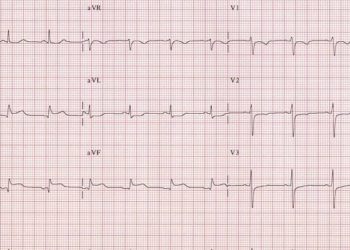Bivalirudin during transport for primary PCI reduces major bleeding
Image: PD
1. Bivalirudin, initiated during transport for primary PCI in patients with STEMI, improved 30-day clinical outcomes with a reduction in major bleeding.
2. The risk of acute stent thrombosis was higher with bivalirudin, compared to unfractionated or low-molecular-weight heparin and optional glycoprotein IIb/IIIa inhibitors.
Evidence Rating Level: 1 (Excellent)
Study Rundown: Antithrombotic therapy, including anticoagulants and antiplatelet agents, are important in the treatment of ST-segment elevation myocardial infarction (STEMI) with percutaneous coronary intervention (PCI). A previous trial comparing bivalirudin, a direct thrombin inhibitor, with unfractionated or low-molecular-weight heparin (LMWH) and glycoprotein IIb/IIIa inhibitors found decreased rates of major bleeding and death at 30 days with bivalirudin. However, bivalirudin was also associated with an increased rate of acute stent thrombosis. This study sought to re-evaluate treatment with bivalirudin in light of a number of changes in clinical practice, such as the use of radial artery PCI access and the increasing use of novel antiplatelet agents. Prehospital administration of anticoagulants is also increasingly applied, particularly in Europe where treatment may be started in the ambulance or in hospitals where PCI is not performed and a patient must be transported.
The results of this study support the benefit of bivalirudin administration on 30-day clinical outcomes and also repeated the finding of increased rates of acute stent thrombosis. The study was limited in that it was not powered to assess 30-day mortality, as was done in previous studies. Additional trials should be conducted to elucidate the effect of bivalirudin on mortality. Data are currently being collected on 1-year mortality.
Click to read the study in NEJM
Click to read an accompanying editorial in NEJM
Relevant Reading: Bivalirudin during Primary PCI in Acute Myocardial Infarction
In-Depth [randomized, controlled trial]: This study enrolled 2218 patients who presented within 12 hours after the onset of symptoms with a presumed diagnosis of STEMI. All patients were intended to have primary PCI within 2 hours after the first medical contact. Patients were randomized to the bivalirudin group or a control group receiving unfractionated or LMWH and routine use of glycoprotein IIb/IIIa inhibitors. The study-drug was administered in the ambulance or in a non-PCI hospital. The primary outcome was defined as a composite of death from any cause or major bleeding not related to coronary-artery bypass grafting (CABG) at 30 days. The primary outcome occurred in 5.1% of patients in the bivalirudin group as compared to 8.5% in the control group (relative risk in the bivalirudin group, 0.60; 95% CI: 0.43 to 0.82; P=0.001). The rate of non-CABG major bleeding was found to be significantly lower in the bivalirudin group than in the control group (2.6% vs. 6.0%; relative risk, 0.43; 95% CI: 0.28 to 0.66; P<0.001). The rate of acute stent thrombosis was significantly higher in the bivalirudin group than in the control group (1.6% vs. 0.5%; relative risk, 2.89; 95% CI: 1.14 to 7.29; P=0.02).
By Xu Gao and Adrienne Cheung© 2013 2minutemedicine.com. All rights reserved. No works may be reproduced without expressed written consent from 2minutemedicine.com. Disclaimer: We present factual information directly from peer reviewed medical journals. No post should be construed as medical advice and is not intended as such by the authors, editors, staff or by 2minutemedicine.com. PLEASE SEE A HEALTHCARE PROVIDER IN YOUR AREA IF YOU SEEK MEDICAL ADVICE OF ANY SORT.






